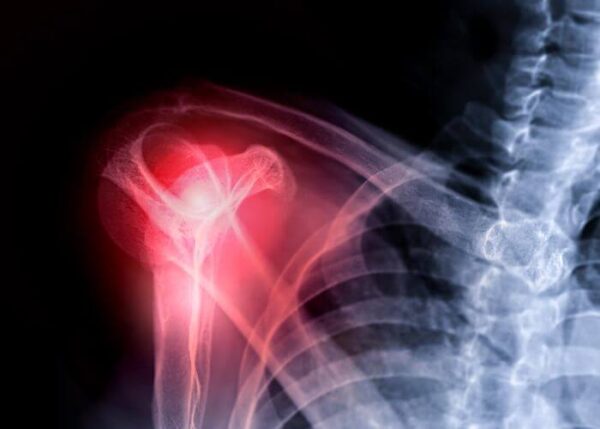What is shoulder impingement?
The shoulder is made up of several joints that combine with muscles and tendons, allowing a large range of motion in the arm. The shoulder’s strength and flexibility can often come at a price however, because its flexibility makes it vulnerable to many different problems. One of the most common physical complaints for patients in Vail, Aspen and the surrounding Denver, Colorado communities is shoulder pain. Shoulder pain can be caused by different conditions but the most common is shoulder impingement, also called shoulder impingement syndrome. Shoulder impingement occurs when the space between the acromion (highest point of the shoulder blade) and rotator cuff narrows. The acromion can rub against (or “impinge” on) the tendon and the bursa, causing irritation and pain. Dr. Armando Vidal, orthopedic shoulder specialist, treats shoulder impingement and can successfully treat patients who have shoulder pain caused by impingement.

What causes shoulder impingement?
Impingement can result in a variety of issues in the subacromial space that result in pain. These include:
- Bursitis – Occurs when the tendon and bursae (fluid-filled sacs) is pinched between the bones of the shoulder, causing inflammation. This occurs if the rotator cuff rubs against the top of the shoulder blade and causes irritation. This sets off a cycle in which the irritation thickens the tendons and the bursa, causing there to be even less space. Inflammation increases and even more impingement pain can occur.
- Rotator Cuff Tendonitis: Occurs when the rotator cuff tendons become irritated or damaged.
- Rotator Cuff Tears: Over time, the rotator cuff can begin to suffer partial or complete tears as a result of being impinged by the acromion.
Who is at risk for shoulder impingement?
Shoulder impingement is often experienced by individuals who repeat the same activity overhead, causing the impingement of the tendons or bursa in the shoulder. Some activities that could cause impingement are:
- Swimming
- Tennis
- Volleyball
- Painting
- Lifting overhead
- Gymnasts
- Baseball
What are the symptoms of shoulder impingement?
Patients who are experiencing shoulder impingement syndrome often report the following symptoms:
- Pain when lifting the arm above the shoulder or rotating it backward
- Dull, minor ache that is constant in the arm or shoulder
- Pain that can radiate from the shoulder to the side of the arm
- Weakness in the shoulder and/or arm
- Pain that worsens at night, especially while sleeping
- Grinding in the shoulder
- Stiffness in the shoulder, loss of range of motion
How is impingement syndrome diagnosed?
Shoulder impingement often gets worse, causing more and more pain over time. Patients in Vail, Aspen and the surrounding Denver metroplex who believe they are experiencing shoulder impingement syndrome should promptly seek the advice of Dr. Armando Vidal to avoid further damage. Dr. Vidal can easily diagnose shoulder impingement syndrome with a history and physical examination. He may also require an x-ray and an MRI scan to rule out other possible injuries.
How is shoulder impingement treated?
The treatment for shoulder impingement is often done conservatively, without surgical intervention. Dr. Vidal will suggest one or more of the following:
- Rest and a decreased use of the injured shoulder for a period of time
- NSAIDs: non-steroidal Anti-inflammatory drugs for pain and inflammation
- Corticosteroid injection: for some patients, an injection into the shoulder can offer pain relief and a powerful local anti-inflammatory which will promote healing.
- Physical therapy: Will often be recommended to help strengthen the muscles and tendons of the shoulder joint.
Surgical Treatment:
On rare occasions, more conservative methods of treating shoulder impingement does not help relieve shoulder pain. In these cases, Dr. Vidal may recommend arthroscopic surgery. Arthroscopic surgery is a minimally invasive surgical procedure which uses a small camera and special surgical instruments. The small camera is used to see inside the shoulder, to find tears or bone spurs that may be contributing to continued shoulder pain. The small, specialized instruments are used to remove and repair any irregularities, allowing the tendons to avoid being pinched and giving the bursa room to cushion without impingement. Dr. Vidal has extensive experience in evaluating and treating patients with shoulder impingement and can help patients in Vail, Aspen and the surrounding Denver, Colorado communities.
Shoulder Joint Specialist
Are you an athlete or individual who participates in activities involving repetitive overhead motions? If so, you may be at risk of developing shoulder impingement. Shoulder impingement is a painful disorder where the top of the shoulder blade and the rotator cuff move closer, resulting in pain during movement. Shoulder specialist, Doctor Armando Vidal can help treat patents in Vail, Aspen, and the surrounding Denver, Colorado communities who believe they have developed a shoulder impingement disorder. Contact Dr. Vidal’s team today!

Locations
180 S Frontage Rd W
Vail, CO 81657
226 Lusher Court
Ste 101
Frisco, CO 80443
322 Beard Creek Road
Edwards, CO 81632


